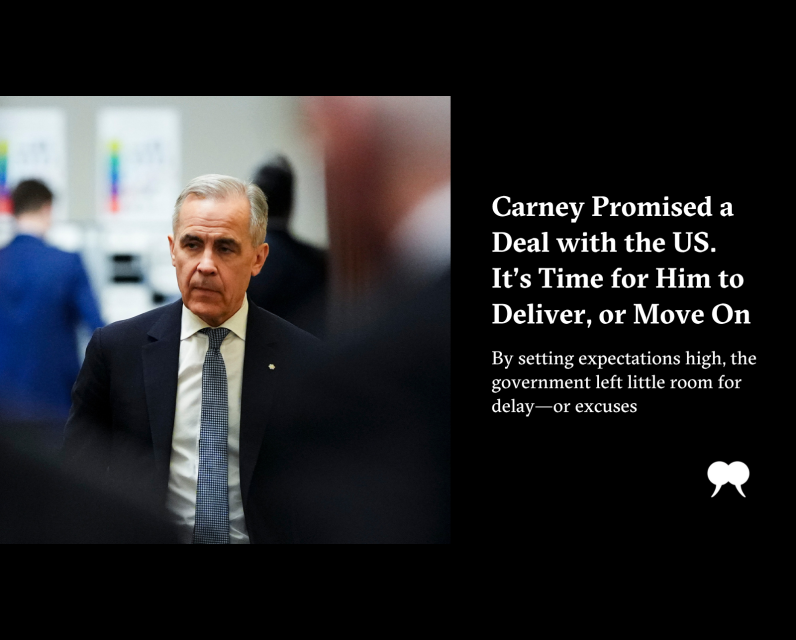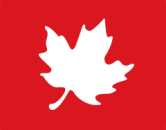Carney Promised a Deal with the US. It’s Time for Him to Deliver, or Move On

Canadians have a message for Prime Minister Mark Carney: “We’re . . . waiting, but we won’t wait forever.” Recent polling from Abacus finds the country backing the government’s priorities, but losing patience with its rate of progress—or lack of progress.
Abacus reports that a mere 33 percent of us believe the government is “on track forging a new relationship with the US,” a number that’s down double digits in recent months. I want to focus here on the government’s plan to remake the Canada–US relationship, but it’s also of note that just 26 percent believe the government is delivering on affordability, with 27 percent saying so about housing affordability in particular. And now Carney is promising to deliver an “austerity” budget.
As Abacus CEO David Coletto puts it:
Canadians still back the government’s agenda. They still believe it would improve their lives if delivered. But patience is finite.The biggest risk for the Carney government isn’t that Canadians dislike its priorities. It’s that they stop believing progress is possible.
Carney’s promise to strike a deal with the US is a signature pledge. It’s not the only one, but it’s a big one. During the spring campaign, the Liberals sold the central banker as a technocrat with a plan and the capacity to navigate Canada through treacherous waters. And now? Yes, Canada has a comparably favourable tariff arrangement with the US, with some exemptions under the Canada–United States–Mexico Agreement, or CUSMA, but what we have is also comparably worse than what we had previously. Canadian jobs and companies are still at risk. Moreover, national expectations are set at, or at least near, the status quo baseline. We don’t want to lose what we had.
The promised deal, which the government has made clear will contain some tariffs, continues to elude national deal makers. Carney himself seems all-too-aware of this as he works to manage expectations . . . downward. The absence of a new bargain isn’t for lack of trying. That’s part of the problem. Carney showed up on day one ready to play ball. The government set deadlines—and, later, missed them. That happens. Such is politics. Such is life. Canadians gave Carney and company some leash. That was reasonable. Donald Trump is, as we say when we’re being polite, mercurial. But leashes can only be so long.
Carney might have shown up to play ball, but Trump didn’t. That’s the Lucy-pulling-away-the-football-once-again problem. Canada had already bowed to American demands on border security and immigration during the dying days of Justin Trudeau’s ministry—concessions we were told were necessary to smooth the path toward a return to normality, or something like it.
When the Carney government took power, it turbo-charged efforts to smooth that path, ditching the digital services tax that has long been a trade (and general) irritant to the US, promising a massive increase in military spending, moving further to securitize the border, dropping retaliatory tariffs, and even reportedly asking to join Trump’s cockamamie Golden Dome missile defence scheme. Maybe the Liberals prefer some of these policies and would have pursued them even absent US tariffs, but adopting them nonetheless looks like giveaways to Washington.
There’s no reason to doubt that the government wants a deal and is working hard on one, nor is there reason to doubt the competence of its negotiators. Dominic LeBlanc, the point-man on securing a bargain, is nothing but competent. He’s a consummate fixer. I don’t know him. I’ve never met him. As far as I know, I’ve never even been in the same room as him, but if I had a serious problem, I’d trust him to solve it. But the best he or his people have been able to do is come home from Washington time after time and deliver some iteration of the line “We’ve made progress.” Maybe he’s playing secret 4D chess, waiting for the courts in the US to solve the problem for us. I don’t know. But “We’re making progress” is not going to be a sufficient response for much longer.
Who knows what Canadians will ultimately accept or tolerate as sufficient delivery on the promise of a deal. The longer things go, one might think expectations would fall as people lose hope that any sort of substantive deal is possible. My bet is that we’ll settle on lower expectations and then blame the government for managing to merely step over a low bar.
Whatever happens, I’m also betting that Canadians will soon tire of endless concessions to Trump. There’s the rub. The Carney government might want a deal a bit too much, if its recent foreign policy and domestic decisions are any indication. But when does it end? It’s unacceptable to sell out the country wholesale in search of a deal and call it a win when we get a few points shaved off a handful of tariffs. To do so would be to, as Calgacus put it during another time and context, “make a desert and call it peace.”
Governments are judged on, among other things, their capacity to deliver material well-being for their citizens. If the government of the day ends up in a Kobayashi Maru situation—an unwinnable scenario—then it’s tough beans for them. Maybe it’s not fair, but it’s politics. And Carney and his party knew what they were getting into and, indeed, leveraged the Trump threat to win the last election. In the course of events, Canadians were promised a win of one sort or another. Now we need one. Soon. Just as we were promised. If that’s not possible, we need to move on.
This originally appeared as “It’s Time for Carney to Deliver on a Deal with the US, or Move On” by David Moscrop (Substack). Reprinted with permission of the author.
The post Carney Promised a Deal with the US. It’s Time for Him to Deliver, or Move On first appeared on The Walrus.


Comments
Be the first to comment